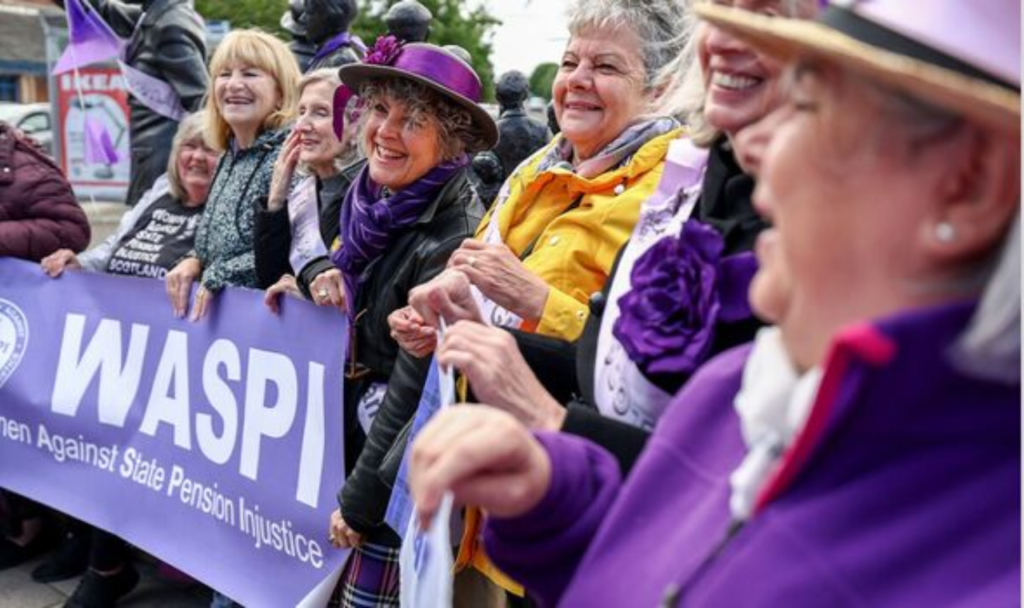The long-running battle over pension injustice affecting millions of women in the UK has escalated, with campaigners from the Women Against State Pension Inequality (WASPI) group threatening legal action against the government. The dispute centers on changes to the state pension age, which left many women born in the 1950s facing financial hardship due to inadequate notice. Now, after the government’s recent decision to deny compensation, the WASPI campaign is taking the fight to the courts.
Background: The Pension Age Controversy
The controversy began with the 1995 and 2011 Pensions Acts, which gradually raised the state pension age for women from 60 to 65, and later to 66, to align it with men’s. While the policy aimed at gender equality in retirement, many women claim they were not properly informed of these changes. Some only found out within months of turning 60 that they would have to wait several more years to receive their pension, leaving them with little time to adjust their financial plans.
- 1995 & 2011 Pensions Acts: Gradually increased the state pension age for women to 65, then 66, to align with men.
- Lack of Notice: Many women claim they weren’t properly informed about these changes, leaving them financially vulnerable.
- Financial Hardship: The abrupt change left many women struggling as they were unprepared for the delay in receiving their pensions.
The Department for Work and Pensions (DWP) has long maintained that efforts were made to notify those affected, but campaigners argue that communication was inadequate. Many women, particularly those who had already left the workforce or made retirement plans based on the previous pension age, faced severe financial difficulties as a result.
Ombudsman Findings and Government Response
In 2021, the Parliamentary and Health Service Ombudsman (PHSO) found that the DWP had committed maladministration by failing to inform women about the pension changes in a timely manner. Following this ruling, campaigners pushed for compensation. In early 2024, the Ombudsman recommended payments ranging between £1,000 and £2,950 per affected woman, which would have resulted in an estimated total payout of £10 billion.
- PHSO Ruling (2021): Found that the DWP committed maladministration by not informing women about pension age changes.
- Ombudsman’s Compensation Recommendation: Suggested payouts of £1,000 – £2,950 per affected woman.
- Government Rejection: In December 2024, the government rejected the Ombudsman’s compensation recommendation, citing financial constraints.
However, in December 2024, the government rejected the compensation proposal, citing financial constraints. Ministers argued that most women had been adequately informed and that implementing large-scale payouts would place a significant burden on public finances. This decision sparked outrage among campaigners and opposition politicians.

WASPI’s Legal Challenge
Following the government’s refusal to compensate affected women, the WASPI campaign announced its intention to pursue legal action. On February 24, 2025, the group issued a “letter before action” to the DWP, warning that they would take the case to the High Court if the decision was not reconsidered.
- WASPI’s Legal Action (February 2025): The campaign issued a “letter before action” to the DWP, warning of legal proceedings.
- Crowdfunding Effort: To support the legal challenge, WASPI launched a crowdfunding campaign aiming to raise £75,000.
Angela Madden, chair of WASPI, stated:
We will not allow the government to sweep this injustice under the rug. Women have been waiting for years for fair treatment, and we will use every legal avenue available to fight for what is right.
To support the legal challenge, WASPI launched a crowdfunding campaign, aiming to raise £75,000 to cover legal fees. The campaign has already gained significant traction, reflecting the deep frustration among those affected.
Political Reactions and Public Support
The government’s decision has been met with criticism from multiple quarters. Labour MPs, in particular, have voiced disappointment. Some have called the move “shameful” and accused ministers of betraying previous commitments to pension fairness.
- Labour Criticism: Labour MPs have criticized the government for its refusal to compensate affected women, calling it “shameful.”
- Potential Political Repercussions: Tensions over the issue could affect the political landscape, especially with an upcoming general election.
A report by The Times suggested that tensions over the issue could have political repercussions, especially as the UK heads into the next general election. The WASPI campaign has repeatedly urged politicians to take action, warning that they will not back down until justice is served.
The Labour Party has historically supported calls for compensation, though it remains unclear whether they would implement payouts if they come into power. More on state pension policies and eligibility criteria can be found on the official UK government pension page.
What Happens Next?
With legal proceedings now on the horizon, the coming months will be crucial for the WASPI campaign. If the case goes to the High Court, it could set a significant precedent regarding government accountability in pension matters.
Several potential outcomes could emerge:
- Government Reconsideration: Facing public pressure and potential legal challenges, the government might reconsider its decision and offer a form of compensation.
- Court Ruling in Favor of WASPI: If the courts rule in favor of the affected women, the government could be forced to provide compensation, setting a precedent for future pension disputes.
- Court Dismisses the Case: If the legal challenge is unsuccessful, it would be a significant setback for campaigners, potentially leaving affected women with no further avenues for redress.
As the legal battle unfolds, the WASPI movement remains determined to seek justice. Whether through the courts or political pressure, campaigners insist that they will not stop fighting until fair compensation is granted.
For further updates on the legal case and campaign developments, visit the official WASPI website.
Conclusion
The fight for pension justice has reached a critical stage. As WASPI women prepare to take legal action, the government faces mounting pressure to address one of the most significant pension disputes in recent history. Whether through legal rulings, political intervention, or continued activism, the demand for fairness remains stronger than ever.
This case serves as a reminder of the importance of clear and transparent communication in pension policies. As millions of women await the outcome, the question remains: will justice finally be served?

Pankaj Kumar is a journalist at Chandigarh X, covering admit cards, recruitment, and government schemes. His articles provide readers with detailed insights into application processes, eligibility, and exam updates.
Outside of work, Pankaj enjoys traveling, fitness, and cricket, often participating in local matches on weekends.



